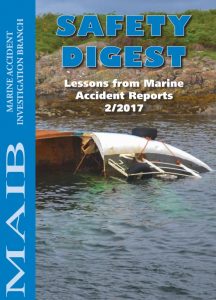The UK MAIB has announced the publication of the second issue for 2017 of its Safety Digest, which includes lessons learned from maritime accidents. This latest edition contains 25 articles, reminding that fires can quite easily start on a ship, equally as on shore.
“Because the emergency services we take for granted ashore will likely not be there to help you when the worst happens, the importance of conducting regular drills, that are as realistic as practicable, cannot be understated. It is all very well for seafarers to receive instruction on how to deal with a range of foreseeable emergencies in theory, but they also need to be given the regular opportunity to put the theory into practice under safe, controlled but challenging circumstances,” said Steve Clinch, Chief Inspector of Marine Accidents.
Further, mobile phones, computers and other electrical devices have become an integral part of modern life but can be lethal if not used responsibly. Te risk of fire from malfunctioning or misused portable electrical equipment can be substantially reduced or even eliminated if operators ensure that portable equipment testing (PAT) becomes routine on board ships and that periodic examinations are made of personal electronic items to ensure they are being used sensibly.
“Sadly, MAIB investigators find that the emergency drills required by the SOLAS convention or domestic regulation are seen by some as a bit of a chore – something to be endured on a Saturday afternoon simply because it’s needed to fill in the official log. In these circumstances, drills are conducted at best in a cursory manner with little learning value for the crews involved. If this is a situation you recognise I would ask you to think carefully how the safety culture within your company/on your ship or boat needs to change,” concluded Mr Clinch.
Explore more by reading the official report herebelow:
































































